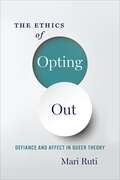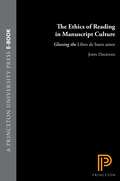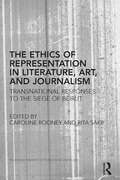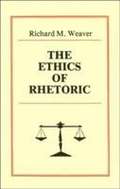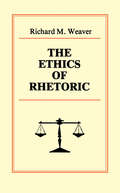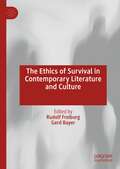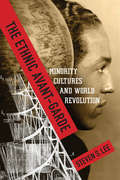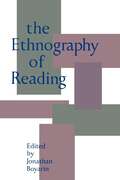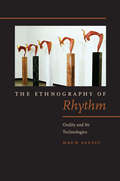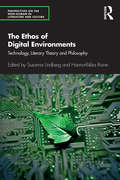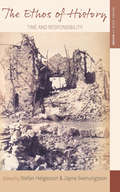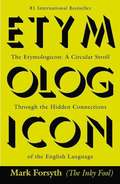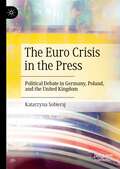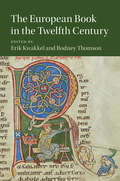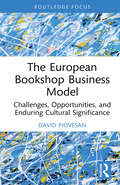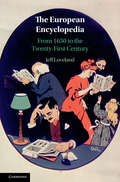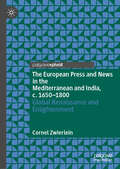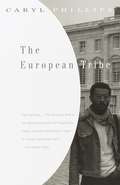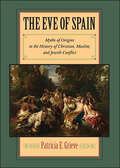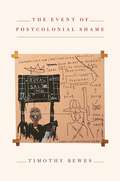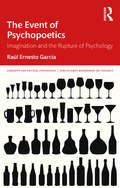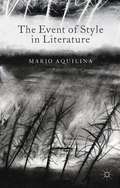- Table View
- List View
The Ethics of Opting Out: Queer Theory's Defiant Subjects
by Mari RutiIn The Ethics of Opting Out, Mari Ruti provides an accessible yet theoretically rigorous account of the ideological divisions that have animated queer theory during the last decade, paying particular attention to the field's rejection of dominant neoliberal narratives of success, cheerfulness, and self-actualization. More specifically, she focuses on queer negativity in the work of Lee Edelman, Jack Halberstam, and Lynne Huffer, and on the rhetoric of bad feelings found in the work of Sara Ahmed, Lauren Berlant, David Eng, Heather Love, and José Muñoz. Ruti highlights the ways in which queer theory's desire to opt out of normative society rewrites ethical theory and practice in genuinely innovative ways at the same time as she resists turning antinormativity into a new norm. This wide-ranging and thoughtful book maps the parameters of contemporary queer theory in order to rethink the foundational assumptions of the field.
The Ethics of Reading in Manuscript Culture: Glossing the Libro de buen amor
by John DagenaisReexamining the roles played by author, reader, scribe, and text in medieval literary practice, John Dagenais argues that the entire physical manuscript must be the basis of any discussion of how meaning was made. Medievalists, he maintains, have relied too heavily on critical editions that seek to create a single, definitive text reflecting an author's intentions. In reality, manuscripts bear not only authorial texts but also a variety of elements added by scribes and readers: glosses, marginal notes, pointing hands, illuminations, and fragments of other, seemingly unrelated works. Using the surviving manuscripts of the fourteenth-century Libro de buen amor, a work that has been read both as didactic treatise on spiritual love and as a celebration of sensual pleasures, Dagenais shows how consideration of the physical manuscripts and their cultural context can shed new light on interpretive issues that have puzzled modern readers.Dagenais also addresses the theory and practice of reading in the Middle Ages, showing that for medieval readers the text on the manuscript leaf, including the text of the Libro, was primarily rhetorical and ethical in nature. It spoke to them directly, individually, always in the present moment. Exploring the margins of the manuscripts of the Libro and of other Iberian works, Dagenais reveals how medieval readers continually reshaped their texts, both physically and ethically as they read, and argues that the context of medieval manuscript culture forces us to reconsider such comfortable received notions as "text" and "literature" and the theories we have based upon them.
The Ethics of Representation in Literature, Art, and Journalism: Transnational Responses to the Siege of Beirut (Routledge Research in Postcolonial Literatures)
by Caroline Rooney Rita SakrThis transnational collection of essays, interviews, and creative pieces on the 1982 Siege of Beirut explores literary representations of the siege by a diverse set of writers alongside journalism and other media including film and art. The book investigates and promotes an awareness of an ethics of representation on questions of extreme emotional investment, comparing representations of the siege to representations of other traumatic events, visiting responses from those of different cultural backgrounds to the same event and considering implications with respect to comparative approaches. Chapters explore how literature, journalism and art contribute to overcoming the dangers of forgetting and denial, memorial excess and fundamentalism, the radicalization of violence, and the complete breakdown of trust on international levels, asking how they challenge geopolitical, intellectual, and psychological states of siege and instead promote awareness, acknowledgement, mourning, and justice across divided communities. The book extends the use of postcolonial methodologies affiliated with history, international relations, and psychoanalysis (memory, trauma) to Middle-Eastern studies, and visits the siege’s effect on different forms of memory and memorialization: selective memory, trauma, gaps and fissures in historical accounts, recording of eyewitness reports, and artistic re-imaginings and realizations of alternative archives.
The Ethics of Rhetoric
by Richard M. WeaverWeaver's Ethics of Rhetoric,originally published in 1953, has been called his most important statement on the ethical and cultural role of rhetoric. A strong advocate of cultural conservatism, Weaver (1910-1953) argued strongly for the role of liberal studies in the face of what he saw as the encroachments of modern scientific and technological forces in society. He was particularly opposed to sociology. In rhetoric he drew many of his ideas from Plato, especially his Phaedrus. As a result, all the main strands of Weaver's thought can be seen in this volume, beginning with his essay on the Phaedrus and proceeding through his discussion of evolution in the 1925 Scopes "Monkey Trial." In addition, this book includes studies of Lincoln, Burke, and Milton, and remarks about sociology and some proposals for modern rhetoric. Each essay poses issues still under discussion today.
The Ethics of Rhetoric
by Richard M. WeaverWeaver's Ethics of Rhetoric, originally published in 1953, has been called his most important statement on the ethical and cultural role of rhetoric. A strong advocate of cultural conservatism, Weaver (1910-1953) argued strongly for the role of liberal studies in the face of what he saw as the encroachments of modern scientific and technological forces in society. He was particularly opposed to sociology. In rhetoric he drew many of his ideas from Plato, especially his Phaedrus. As a result, all the main strands of Weaver's thought can be seen in this volume, beginning with his essay on the Phaedrus and proceeding through his discussion of evolution in the 1925 Scopes "Monkey Trial." In addition, this book includes studies of Lincoln, Burke, and Milton, and remarks about sociology and some proposals for modern rhetoric. Each essay poses issues still under discussion today.
The Ethics of Survival in Contemporary Literature and Culture
by Gerd Bayer Rudolf FreiburgThe Ethics of Survival in Contemporary Literature and Culture delves into the complex problems involved in all attempts to survive. The essays analyze survival in contemporary prose narratives, short stories, poems, dramas, and theoretical texts, but also in films and other modes of cultural practices. Addressing diverse topics such as memory and forgetting in Holocaust narratives, stories of refugees and asylum seekers, and representations of war, the ethical implications involved in survival in texts and media are brought into a transnational critical discussion. The volume will be of potential interest to a wide range of critics working on ethical issues, the body, and the politics of art and literature.
The Ethnic Avant-Garde
by Steven S. LeeDuring the 1920s and 1930s, American minority artists and writers collaborated extensively with the Soviet avant-garde, seeking to build a revolutionary society that would end racial discrimination and advance progressive art. Making what Claude McKay called "the magic pilgrimage" to the Soviet Union, these intellectuals placed themselves at the forefront of modernism, using radical cultural and political experiments to reimagine identity and decenter the West. Shining rare light on these efforts, The Ethnic Avant-Garde makes a unique contribution to interwar literary, political, and art history, drawing extensively on Russian archives, travel narratives, and artistic exchanges to establish the parameters of an undervalued "ethnic avant-garde." These writers and artists cohered around a distinct form that mirrored Soviet techniques of montage, fragment, and interruption. They orbited interwar Moscow, where an international avant-garde converged with the Communist International. Chapters explore Vladimir Mayakovsky's 1925 visit to New York City via Cuba and Mexico, during which he wrote Russian-language poetry in an "Afro-Cuban" voice; Langston Hughes's translations of these poems while in Moscow, which he visited to assist on a Soviet film on African American life; a futurist play condemning Western imperialism in China, which became Broadway's first major production to feature a predominantly Asian American cast; and efforts to imagine the Bolshevik Revolution as Jewish messianic arrest, followed by the slow political disenchantment of the New York Intellectuals. Through an absorbing collage of cross-ethnic encounters that also include Herbert Biberman, Sergei Eisenstein, Paul Robeson, and Vladimir Tatlin, this book remaps global modernism along minority and Soviet-centered lines, further advancing the avant-garde project of seeing the world anew.
The Ethnic Avant-Garde: Minority Cultures and World Revolution (Modernist Latitudes)
by Steven S. LeeDuring the 1920s and 1930s, American minority artists and writers collaborated extensively with the Soviet avant-garde, seeking to build a revolutionary society that would end racial discrimination and advance progressive art. Making what Claude McKay called "the magic pilgrimage" to the Soviet Union, these intellectuals placed themselves at the forefront of modernism, using radical cultural and political experiments to reimagine identity and decenter the West. Shining rare light on these efforts, The Ethnic Avant-Garde makes a unique contribution to interwar literary, political, and art history, drawing extensively on Russian archives, travel narratives, and artistic exchanges to establish the parameters of an undervalued "ethnic avant-garde." These writers and artists cohered around distinct forms that mirrored Soviet techniques of montage, fragment, and interruption. They orbited interwar Moscow, where the international avant-garde converged with the Communist International. The book explores Vladimir Mayakovsky's 1925 visit to New York City via Cuba and Mexico, during which he wrote Russian-language poetry in an "Afro-Cuban" voice; Langston Hughes's translations of these poems while in Moscow, which he visited to assist on a Soviet film about African American life; a futurist play condemning Western imperialism in China, which became Broadway's first major production to feature a predominantly Asian American cast; and efforts to imagine the Bolshevik Revolution as Jewish messianic arrest, followed by the slow political disenchantment of the New York Intellectuals. Through an absorbing collage of cross-ethnic encounters that also include Herbert Biberman, Sergei Eisenstein, Paul Robeson, and Vladimir Tatlin, this work remaps global modernism along minority and Soviet-centered lines, further advancing the avant-garde project of seeing the world anew.
The Ethnography of Reading
by Jonathan BoyarinWriting, the subject of much innovative scholarship in recent years, is only half of what we call literacy. The other half, reading, now finally receives its due in these groundbreaking essays by a distinguished group of anthropologists and literary scholars.The essays move well beyond the simple rubric of "literacy" in its traditional sense of evolutionary advancement from oral to written communication. Some investigate reading in exotically cross-cultural contexts. Some analyze the long historical transformation of reading in the West from a collective, oral practice to the private, silent one it is today, while others demonstrate that in certain Western contexts reading is still very much a social activity. The reading situations described here range from Anglo-Saxon England to contemporary Indonesia, from ancient Israel to a Kashaya Pomo Indian reservation.Filled with insights that erase the line between orality and textuality, this collection will attract a broad readership in anthropology, literature, history, and philosophy, as well as in religious, gender, and cultural studies.
The Ethnography of Rhythm: Orality and Its Technologies (Verbal Arts: Studies in Poetics)
by Haun SaussyWinner of the Modern Language Association's Aldo and Jeanne Scaglione Prize for Comparative Literary StudiesWho speaks? The author as producer, the contingency of the text, intertextuality, the “device”—core ideas of modern literary theory—were all pioneered in the shadow of oral literature. Authorless, loosely dated, and variable, oral texts have always posed a challenge to critical interpretation. When it began to be thought that culturally significant texts—starting with Homer and the Bible—had emerged from an oral tradition, assumptions on how to read these texts were greatly perturbed. Through readings that range from ancient Greece, Rome, and China to the Cold War imaginary, The Ethnography of Rhythm situates the study of oral traditions in the contentious space of nineteenth- and twentieth-century thinking about language, mind, and culture. It also demonstrates the role of technologies in framing this category of poetic creation. By making possible a new understanding of Maussian “techniques of the body” as belonging to the domain of Derridean “arche-writing,” Haun Saussy shows how oral tradition is a means of inscription in its own right, rather than an antecedent made obsolete by the written word or other media and data-storage devices.
The Ethos of Digital Environments: Technology, Literary Theory and Philosophy (Perspectives on the Non-Human in Literature and Culture)
by Susanna LindbergWhile self-driving cars and autonomous weapon systems have received a great deal of attention in media and research, the general requirements of ethical life in today’s digitalizing reality have not been made sufficiently visible and evaluable. This collection of articles from both distinguished and emerging authors working at the intersections of philosophy, literary theory, media, and technology does not intend to fix new moral rules. Instead, the volume explores the ethos of digital environments, asking how we can orient ourselves in them and inviting us to renewed moral reflection in the face of dilemmas they entail. The authors show how contemporary digital technologies model our perception, narration as well as our conceptions of truth, and investigate the ethical, moral, and juridical consequences of making public and societal infrastructures computational. They argue that we must make the structures of the digital environments visible and learn to care for them.
The Ethos of History: Time and Responsibility (Making Sense of History #34)
by Jayne Svenungsson Stefan HelgessonAt a time when rapidly evolving technologies, political turmoil, and the tensions inherent in multiculturalism and globalization are reshaping historical consciousness, what is the proper role for historians and their work? By way of an answer, the contributors to this volume offer up an illuminating collective meditation on the idea of ethos and its relevance for historical practice. These intellectually adventurous essays demonstrate how ethos—a term evoking a society’s “fundamental character” as well as an ethical appeal to knowledge and commitment—can serve as a conceptual lodestar for history today, not only as a narrative, but as a form of consciousness and an ethical-political orientation.
The Ethos of History: Time and Responsibility (Making Sense of History #34)
by Stefan Helgesson and Jayne SvenungssonAt a time when rapidly evolving technologies, political turmoil, and the tensions inherent in multiculturalism and globalization are reshaping historical consciousness, what is the proper role for historians and their work? By way of an answer, the contributors to this volume offer up an illuminating collective meditation on the idea of ethos and its relevance for historical practice. These intellectually adventurous essays demonstrate how ethos—a term evoking a society’s “fundamental character” as well as an ethical appeal to knowledge and commitment—can serve as a conceptual lodestar for history today, not only as a narrative, but as a form of consciousness and an ethical-political orientation.
The Etymologicon
by Mark ForsythDo you know why... ...a mortgage is literally a death pledge? ...why guns have girls' names? ...why salt is related to soldier? You're about to find out... The Etymologicon (e-t?-'mä-lä-ji-kän) is: *Witty (wi-te\): Full of clever humor *Erudite (er-?-dit): Showing knowledge *Ribald (ri-b?ld): Crude, offensive The Etymologicon is a completely unauthorized guide to the strange underpinnings of the English language. It explains: how you get from "gruntled" to "disgruntled"; why you are absolutely right to believe that your meager salary barely covers "money for salt"; how the biggest chain of coffee shops in the world (hint: Seattle) connects to whaling in Nantucket; and what precisely the Rolling Stones have to do with gardening.
The Euro Crisis in the Press: Political Debate in Germany, Poland, and the United Kingdom
by Katarzyna SobierajThis book offers a comparative study of the political debate on the Euro crisis in the press. In the tradition of Critical Discourse Analysis, it investigates the ways in which discourse produces and reproduces social domination, and demystifies the hegemony of specific discourses. Combining quantitative content-based and qualitative text-based analyses, the book examines the discursive constructions of the crisis in a selection of broadsheet newspapers in Germany, Poland, and the UK, and discloses their ideological foundations. The analysis of the representations of the crisis, social actors and their agency, and legitimating strategies, including the use of metaphors, demonstrates how neoliberalism determined the hegemonic discourse on the Euro crisis. It resulted in ideologically biased discursive constructions that created and legitimised an image of non-agentic social change. The book will appeal to an international audience of discourse and media studies. It will be of interest to university teachers, graduate and undergraduate students and researchers of international and comparative media studies, political communication, linguistics, and politics.
The European Book in the Twelfth Century (Cambridge Studies in Medieval Literature #101)
by Erik Kwakkel Rodney ThomsonThe 'long twelfth century' (1075–1225) was an era of seminal importance in the development of the book in medieval Europe and marked a high point in its construction and decoration. This comprehensive study takes the cultural changes that occurred during the 'twelfth-century Renaissance' as its point of departure to provide an overview of manuscript culture encompassing the whole of Western Europe. Written by senior scholars, chapters are divided into three sections: the technical aspects of making books; the processes and practices of reading and keeping books; and the transmission of texts in the disciplines that saw significant change in the period, including medicine, law, philosophy, liturgy, and theology. Richly illustrated, the volume provides the first in-depth account of book production as a European phenomenon.
The European Bookshop Business Model: Challenges, Opportunities, and Enduring Cultural Significance
by David PiovesanDrawing on original primary data, this book offers a comparative account of the European bookshop model, charting how it has evolved in the contemporary economy, how recent industry transformations have impacted it, and how bookshops have sought to adapt to new market conditions.Covering the period from the fall of the Berlin Wall in 1989 up until the present day, this book considers the evolution, both historic and economic, of European countries and book markets to arrive at a broad picture of the European bookshop model today. It draws on interviews with over 250 book industry players across 23 countries to critically consider the evolution of systems, legislative frameworks, reading habits, competition, and market structure, situating these changes within a broader set of current issues and cultural shifts. Alongside the ongoing challenges posed by disruption – from digitization to a hyper-abundance of books – the author also reflects on the key strategies that bookshops have deployed to overcome them, including via collective action and curation. Depicting an uncertain outlook for the industry, including the impact of AI, this text nonetheless offers hope for the future of the bookshop and bears testament to its enduring social and cultural significance.The European Bookshop Business Model is recommended reading for advanced students and researchers in fields including Book Studies, Publishing Studies, Cultural Industries, and Retail and also for book players.
The European Encyclopedia: From 1650 to the Twenty-First Century
by Jeff LovelandFirst taking shape during the seventeenth century, the European encyclopedia was an alphabetical book of knowledge. For the next three centuries, printed encyclopedias in the European tradition were an element of culture and peoples' lives, initially just among Europe's educated elite but ultimately through much of the literate world. Organized around themes such as genre, economics, illustration, and publishing, The European Encyclopedia is the first comprehensive survey of encyclopedias to be written in English in more than fifty years. Engaging with printed encyclopedias, now largely extinct and the object of nostalgia, as well as the global phenomenon of Wikipedia, Jeff Loveland brings together encyclopedias from multiple languages (notably English, French, and German, amongst others). This book will be of interest to anyone, from academics in the humanities to non-academic readers, with an interest in encyclopedias and their history.
The European Press and News in the Mediterranean and India, c. 1650-1800: Global Renaissance and Enlightenment
by Cornel ZwierleinThis book reconstructs the first attempts to integrate Europe and Asia in terms of newspaper distribution, reception, and news coverage during the seventeenth and eighteenth centuries. The East India Companies shared news via the &“overland route&” from Aleppo through Persia to India by using professional runners, riders, and postal relay systems. This book reminds us of the special character of the European handwritten and printed newspapers in Italy, Germany, France, and England as a precondition for what merchants in India and the Levant were likely to miss abroad. Comparative sections address such newspapers&’ relationship with the Moghul newsletter system (akhbārāt) and whether the European Enlightenment was &“meeting&” a global Indian Renaissance in terms of news circulation. The conclusion compares these Euro-Indian realities with similar handwritten news circulation and printed press in China and in the Americas.
The European Tribe
by Caryl PhillipsIn this richly descriptive and haunting narrative, Caryl Phillips chronicles a journey through modern-day Europe, his quest guided by a moral compass rather than a map. Seeking personal definition within the parameters of growing up black in Europe, he discovers that the natural loneliness and confusion inherent in long jorneys collides with the bigotry of the "European Tribe"-a global community of whites caught up in an unyielding, Eurocentric history.Phillips deftly illustrates the scenes and characters he encounters, from Casablanca and Costa del Sol to Venice, Amsterdam, Oslo, and Moscow. He ultimately discovers that "Europe is blinded by her past, and does not understand the high price of her churches, art galleries, and history as the prison from which Europeans speak."In the afterword to the Vintage edition, Phillips revisits the Europe he knew as a young man and offers fresh observations.
The Evangelical Party and Samuel Taylor Coleridge’s Return to the Church of England (Routledge Studies in Romanticism)
by Christopher W CorbinIt has long been accepted that when Samuel Taylor Coleridge rejected the Unitarianism of his youth and returned to the Church of England, he did so while accepting a general Christian orthodoxy. Christopher Corbin clarifies Coleridge’s religious identity and argues that while Coleridge’s Christian orthodoxy may have been sui generis, it was closely aligned with moderate Anglican Evangelicalism. Approaching religious identity as a kind of culture that includes distinct forms of language and networks of affiliation in addition to beliefs and practices, this book looks for the distinguishable movements present in Coleridge’s Britain to more precisely locate his religious identity than can be done by appeals to traditional denominational divisions. Coleridge’s search for unity led him to desire and synthesize the "warmth" of heart religion (symbolized as Methodism) with the "light" of rationalism (symbolized as Socinianism), and the evangelicalism in the Church of England, being the most chastened of the movement, offered a fitting place from which this union of warmth and light could emerge. His religious identity not only included many of the defining Anglican Evangelical beliefs, such as an emphasis on original sin and the New Birth, but he also shared common polemical opponents, appropriated evangelical literary genres, developed a spirituality centered on the common evangelical emphases of prayer and introspection, and joined Evangelicals in rejecting baptismal regeneration. When placed in a chronological context, Coleridge’s form of Christian orthodoxy developed in conversation with Anglican Evangelicals; moreover, this relationship with Anglican Evangelicalism likely helped facilitate his return to the Church of England. Corbin not only demonstrates the similarities between Coleridge’s relationship to a form of evangelicalism with which most people have little familiarity, but also offers greater insight into the complexities and tensions of religious identity in late eighteenth and early nineteenth century Britain as a whole.
The Eve of Spain: Myths of Origins in the History of Christian, Muslim, and Jewish Conflict
by Patricia E. GrieveThe Eve of Spain demonstrates how the telling and retelling of one of Spain’s founding myths played a central role in the formation of that country’s national identity. King Roderigo, the last Visigoth king of Spain, rapes (or possibly seduces) La Cava, the daughter of his friend and counselor, Count Julian. In revenge, the count travels to North Africa and conspires with its Berber rulers to send an invading army into Spain. So begins the Muslim conquest and the end of Visigothic rule. A few years later, in Northern Spain, Pelayo initiates a Christian resistance and starts a new line of kings to which the present-day Spanish monarchy traces its roots.Patricia E. Grieve follows the evolution of this story from the Middle Ages into the modern era, as shifts in religious tolerance and cultural acceptance influenced its retelling. She explains how increasing anti-Semitism came to be woven into the tale during the Christian conquest of the peninsula—in the form of traitorous Jewish conspirators. In the sixteenth century, the tale was linked to the looming threat of the Ottoman Turks. The story continued to resonate through the Enlightenment and into modern historiography, revealing the complex interactions of racial and religious conflict and evolving ideas of women’s sexuality.In following the story of La Cava, Rodrigo, and Pelayo, Grieve explains how foundational myths and popular legends articulate struggles for national identity. She explores how myths are developed around few historical facts, how they come to be written into history, and how they are exploited politically, as in the expulsion of the Jews from Spain in 1492 followed by that of the Moriscos in 1609. Finally, Grieve focuses on the misogynistic elements of the story and asks why the fall of Spain is figured as a cautionary tale about a woman’s sexuality.
The Event of Postcolonial Shame (Translation/Transnation #26)
by Timothy BewesIn a postcolonial world, where structures of power, hierarchy, and domination operate on a global scale, writers face an ethical and aesthetic dilemma: How to write without contributing to the inscription of inequality? How to process the colonial past without reverting to a pathology of self-disgust? Can literature ever be free of the shame of the postcolonial epoch--ever be truly postcolonial? As disparities of power seem only to be increasing, such questions are more urgent than ever. In this book, Timothy Bewes argues that shame is a dominant temperament in twentieth-century literature, and the key to understanding the ethics and aesthetics of the contemporary world. Drawing on thinkers such as Jean-Paul Sartre, Frantz Fanon, Theodor Adorno, and Gilles Deleuze, Bewes argues that in literature there is an "event" of shame that brings together these ethical and aesthetic tensions. Reading works by J. M. Coetzee, Joseph Conrad, Nadine Gordimer, V. S. Naipaul, Caryl Phillips, Ngugi wa Thiong'o, and Zoë Wicomb, Bewes presents a startling theory: the practices of postcolonial literature depend upon and repeat the same structures of thought and perception that made colonialism possible in the first place. As long as those structures remain in place, literature and critical thinking will remain steeped in shame. Offering a new mode of postcolonial reading, The Event of Postcolonial Shame demands a literature and a criticism that acknowledge their own ethical deficiency without seeking absolution from it.
The Event of Psychopoetics: Imagination and the Rupture of Psychology (Concepts for Critical Psychology)
by Raúl GarcíaThe Event of Psychopoetics overviews and investigates the notion of psychopoetics, a sociopsychological event that involves re-creative slips and that emerges under certain cultural conditions and power relations in the context of everyday interaction and through certain modes of dialoguing and conversing. This transdisciplinary text takes the reader through the thought processes of Deleuze, Guattari, Agamben, Maffesoli, Foucault, Butler, Haraway, and Braidotti, among others, addressing debates that are integral to the critique of psychology and its devices of subjectivization and normalization. Garcia takes a unique approach by reflecting on how psychopoetics contrasts institutionalized dialogues, while constantly emphasizing the generative and transformative potency of social worlds effectuated in the impetuous play of poetics. The book combines the rigor of academic research with the creative display of ideas that open diverse, suggestive lines of reflection on everyday interlocution and its possibilities of reinvention, modes of social existence, and the relation between subjectivity and the designs of power. A truly unique reading experience, this book is ideal for students, instructors, and researchers in the fields of philosophy, social psychology and sociological thought, discourse studies, literary theory, and cultural analysis.
The Event of Style in Literature
by Mario AquilinaThe Event of Style in Literature brings discussions about the question of style up-to-date by schematising the principal issues relating to the topic through a critical overview of the canon of style studies. It reads the work of Jacques Derrida, Maurice Blanchot, and Hans-Georg Gadamer as groundbreaking and 'eventful' interventions.
